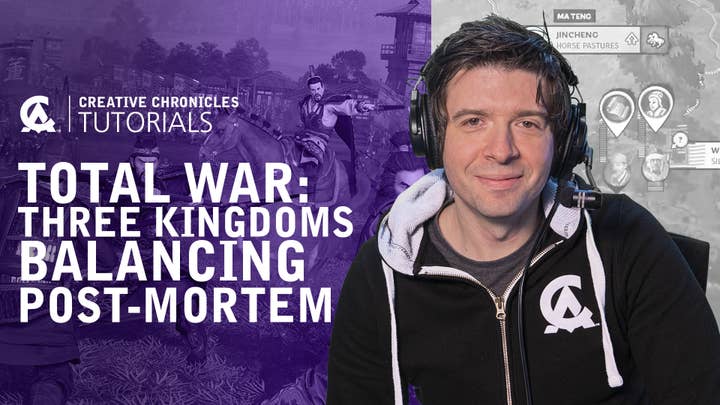Creative Chronicles: A balancing post-mortem of Total War Three Kingdoms
The GamesIndustry.biz Academy partners with Creative Assembly to publish its Creative Chronicles video series, today focusing on strategy game balancing
Creative Assembly's educational series, Creative Chronicles, provides in-depth tutorials, insights into game development and key information that aims to educate and inspire future talent interested in building games. You can find the list of all the previously published videos on this page. You can find all the videos on this page.
Balancing a complex strategy game where a multitude of systems are interacting with each other is a delicate challenge. Players construct buildings, research technologies, appoint administrators in their realm; their realm consists of regions and provinces, with various buildings, edicts, and specialisations. The player's characters have skills, traits and relationships are all interconnected with each other. While it is important that each system is balanced, more importantly, this orchestra of systems in the game must deliver a compelling strategy game experience.
This presentation by senior game designer Leif Walter discusses some key lessons learned from the balancing process of Total War: Three Kingdoms. The lessons learned are explored by considering key paradigms of strategy game balancing, as well as looking at examples from Total War: Three Kingdoms and other strategy games.
We begin by focusing on the matter of strategy and breaking down the components that are vital for a strategy game, looking at how balancing can support strategic decision making, and how well this is coming through in Total War: Three Kingdoms. The audience will learn about the balance between tactics and strategy and Walter will look at how improvements could be made to future Total War games.
The second major lesson featured in this video is the importance of gut or emotional fun. Strategy games typically excel at cerebral enjoyment -- the enjoyment of number crunching -- but the emotional side is equally important. In this video, we investigate how balancing can help to deliver this vital part of the experience. The suggested paradigm is not to focus on balancing as a constraining mechanism, but rather to see it as a tool to enable the player and to enable rewarding and satisfying decisions. Again, we reflect on some learnings from Three Kingdoms and also look at some good ways other strategy games achieve this.
Finally, the presentation closes with a third lesson learned about the push towards game polish at the end of the development cycle. Optimising a game's balance and achieving an overall polished experience is only possible if you can identify the core issues to the experience. Every game requires different tools to measure by how much the intended core experience is fulfilled. By discussing one of the core tools formalised during the development of Three Kingdoms, we look at the importance of embracing the polish phase.
This talk is aimed at strategy game developers, as well as game designers generally interested in game balance and overall game polish.
The GamesIndustry.biz Academy guides to making games cover a wide range of topics, from finding the right game engine to applying for Video Games Tax Relief, to crunch, to moving to live-service games and free-to-play. Have a browse.

